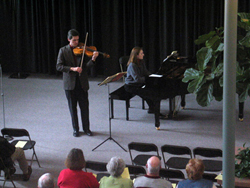 |
Thomas Kluge, left, first chair violist in the Omaha Symphony, and his wife, Michele Favero-Kluge, a pianist with the symphony, perform during the January “Music as Medicine” concert. The concert series continues at noon on Thursday when the family jazz ensemble, Burt St. Boys, performs in the Durham Outpatient Center’s West Atrium. |
Whether for stress reduction or relaxation, “Music as Medicine” provides a healing influence to audiences of all ages. Now in its third year, the monthly concerts also provide relief from the day-to-day hustle and bustle.
“The goal of ‘Music as Medicine’ is to provide an interlude of quiet reflection or joyous listening through quality performances,” said John Benson, M.D., who initiated the idea for the concert series in 2004. “In an environment of emotionally-demanding, high-tech service to seriously ill patients, an hour of enjoyable distraction offers real benefit.”
Patients, health care providers, staff and students are invited to the free classical, jazz, chamber or vocal music concerts featuring local professionals. In addition to the hour-long interlude, musicians expand the audience’s knowledge of music and composers, “so appropriate in an educational institution like UNMC,” said Dr. Benson, professor of internal medicine at UNMC.
“‘Music as Medicine’ brings a wonderful form of communication to the campus,” said longtime supporter Myrna Newland, M.D., director of UNMC’s Equity Office. “It’s an unexpected treat for patients and family members who pass from the parking structure to the hospital and clinics. I particularly enjoy the classical small group ensembles.”
Except during the summer, concerts are regularly held at noon on the third Thursday of the month in the Durham Outpatient Center West Atrium. Seating is arranged, but balcony watching is encouraged, Dr. Benson said. Quiet lunches are welcome, but the performances are concerts, he said, not background music for a social gathering.
Past concerts have featured chamber musicians on strings, woodwinds and piano; jazz performers; pop vocalists and high school choirs performing holiday and classical selections.
The concerts are free, Dr. Benson said, thanks to the chancellor, deans of the College of Medicine and College of Nursing, UNMC Physicians, The Center for Continuing Education and private donors, who have graciously subsidized the expenses.
Hobart Wiltse, M.D., a retired professor from the department of pediatrics, is a longtime supporter of the series. “Music has been a major — but mostly private — hobby throughout my medical career. I’ve often said that people working in a demanding field should have an equally demanding hobby, which will periodically take their thoughts off the job,” he said. “People in the health fields are often multi-talented and have grown up with music exposure and participation. Omaha is extraordinarily rich in the arts and these concerts offer our health care workers, students and patients a very nice one-hour diversion.”
Jackie Farley of UNMC’s Continuing Education agrees. She encourages the campus community to stop by the Feb. 15 jazz performance by the Burt Street Boys. Farley has managed the “Music as Medicine” concert arrangements, budget, publicity and meetings of the Noon Concerts Committee since its inception.
Nurses on floors and in clinics are encouraged to refer patients and families waiting for appointments, tests or operations on loved ones to the concert. Flyers will be posted in waiting rooms on concert days, and staff members are encouraged to inform their patients.
Students oscillating between the Durham Research Center and Wittson Hall also are encouraged to stop in the West Atrium with their lunches for an interlude of music, Dr. Benson said.
“We would love to see the floor seating and balconies filled with people on the third Thursday of each month,” Dr. Benson. “In this technological age, music can serve as medicine by providing a calming and humane repose in a hospital and health care setting.”